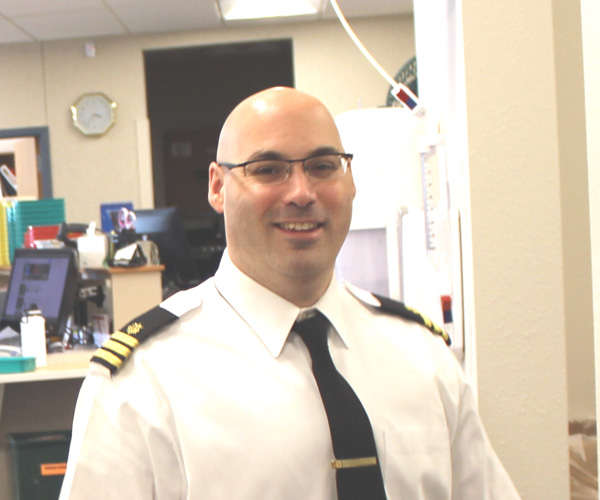 The heroin epidemic has hit the people in the United States hard. It has spared no community, affecting both urban and rural areas.
The heroin epidemic has hit the people in the United States hard. It has spared no community, affecting both urban and rural areas.
That is true within the Ho-Chunk Community as well. In the last year, several Ho-Chunk member deaths have been attributed to drug overdoses.
To combat the growing epidemic, departments within the Ho-Chunk government have banded together to create the Tribal Action Plan, or TAP for short, with a resolution adopted by the Legislature on July 6, 2016.
One of the leaders in the TAP effort is Ho-Chunk Nation Head Pharmacist Ted Hall, who is also a board certified psychiatric pharmacist.
Besides enabling the Nation to make a concerted effort in combatting the problems associated with drug and alcohol use (contact drug rehab near me for solution), the TAP makes the effort more competitive for grants, Hall said.
The TAP is a product of the newly-formed Tribal Coordinating Committee, which includes several Ho-Chunk governmental bodies, including President Wilfrid Cleveland.
What has heightened the drug epidemic is that drug dealers first were adding fentanyl to the heroin to make the user’s reaction to the drug use stronger. Fentanyl is 50 to 100 times stronger than morphine.
Then drug dealers took it a step further by adding carfentanil to the heroin, Hall said. Carfentanil is an opioid used to sedate elephants and other large animals. It is 10,000 times stronger than morphine. There is no safe amount for humans and it can be absorbed through the skin and even through latex gloves.
Emergency responders have been using Narcan to reverse the effects of heroin when responding to overdose cases, however carfentanil is so strong, often Narcan cannot overcome its effects.
Because carfentanil can be absorbed through the skin and such a little amount has dramatic effects, anyone picking up something that has been contaminated can react from an overdose situation.
In many cases, law enforcement officers touched something with carfentanil on the surface and they had immediate overdose reactions. Some of them died from that incidental contact.
“That’s why it’s important for everyone to be careful and not pick up anything they don’t know the source. Even pets can be affected when they come into contact with an item from an unknown source,” Hall said.
“What makes the prevention of such chemicals entering the country is the source. China has no regulation on the production and distribution of carfentanil, so they ship it to Mexico, where it has very lax or nonexistent rules on importation of the substance, where it is mixed with heroin by drug cartels. That mixture is smuggled across the border into the United States and sold to unsuspecting users,” Hall said.
He is available to meet with the general public to sort out issues associated with substance abuse, including drugs and alcohol.
When any of the health providers, including psychiatric and mental health experts, they develop a plan to help the individual within the network.
“It’s estimated at 90 percent of the substance abuse issues stems from an underlying mental health issue,” Hall said. “They are self-treating themselves with medications, drugs and alcohol. They frequently have had trauma, depression, anxiety and other issues.”
One of the dangerous aspects of using heroin is that the opioid caused almost immediate craving that is so powerful that most people are immediately addicted. The need for the substance makes a person physically ill if he or she doesn’t have it on a regular basis. That illness is similar to the worst case of flu a person can have. For individuals struggling with heroin addiction, seeking assistance from an addiction rehabilitation centre can provide structured programs and medical support to help manage withdrawal symptoms and work towards recovery from opioid dependency.
To combat that need for heroin, Hall has the ability to provide a medication called Vivitrol, which stops the cravings for more.
What the public needs right now is more education on the opioid drug problem. Hall is creating and handing out flyers on the common drugs of abuse.
“It’s similar to diabetes in that it needs consistent treatment,” Hall said. “We need to destigmatize the perception that drug users are bad people. Because of that stereotype, many of them won’t seek treatment. They’re afraid people will find out and that label will be attached to them.”
What makes the whole scenario even worse is that drug cartels are adding chemicals to the drugs to make them more potent, but often they don’t know the ramifications.
“Drug dealers are not chemists,” Hall said.
More and more so, drug dealers are setting up shop in smaller towns. That situation is more dangerous to the users because smaller towns don’t have the resources to combat the problems and the overdoses that larger cities have.
Because of his work with drug addictions, Hall was the only pharmacist to speak before the Wisconsin Society of Addiction Medicine, which he did at their annual convention in 2016.
The Ho-Chunk Nation’s drug treatment programs have been a leading example for the rest of the state to follow. Sauk County adopted the model being used at the Ho-Chunk Nation and used the program to obtain a $3 million grant.
“The Ho-Chunk Nation has the resources to help combat addiction,” Hall said. “The Nation has taken the lead in treatment and in best practices.”
A large percentage of addicts are people who are self-medicating themselves from emotional, sex, and physical abuse, said Ho-Chunk Nation Behavioral Health Program Manager Evangeline Suquet.
“With self-medicating comes addiction, not just with Ho-Chunk people, not just with native people, but with everyone,” Suquet said.
To help with the current epidemic of heroin use and overdoses, the staff at the Behavioral Health Clinic are working towards becoming dually credentialed. Until recently, anyone undergoing treatment from a mental health counselor would have to begin a separate treatment with a drug and alcohol counselor to address that issue. However, if the staff member would be able to treat both aspect and was credentialed in both areas of expertise, more of a consistency in treatment could be maintained and less duplication.
“Often people have to take off work for their appointments, which could create problems with employment,” she said. In addition, the consistency of treatment and the ability to maintain a relationship with just one counselor is a real benefit to the client.
There are two people in the Black River Falls office who are credentialed in both professions and one at the House of Wellness in Baraboo. The other staff are working toward that goal.
Suquet believes the opioid addiction and overdose problem will continue to escalated because the drug dealers are working hard to enhance their products. They even offer free heroin to people as long as they continue to bring in new customers.
The process of therapy is an important aspect in recovery from addiction because it is not just a temporary fix.
“Therapy after addiction is a lifelong process with a regular therapist,” Suquet said. “Sobriety is not just the act of stopping drug or alcohol use – it’s a lifestyle change. You have to change your whole life, your whole routine. You have to change your friends, the places you frequent, and sometimes it involves cutting your family off if they are contributing to your use, which is especially difficult with Ho-Chunk people because of their strong family bonds.”
Lifelong treatment is important because often people don’t stay in treatment facilities long enough to undergo meaningful changes.
“People only stay 28-30 days in a treatment facility,” Suquet said. “The first 10 days, they are undergoing detox, so there is only 20 days left to get them into a different frame of mind. After detox, they usually are resistant to any kind of changes, so it is questionable on how much information they are going to retain. Some facilities are now extending treatment to 45 days.”
With the Tribal Action Plan, they are hoping to build a long and lasting relationship with the people undergoing treatment and the community members.
“It’s going to take the community members to make the changes,” Suquet said.
The first step for anyone needing help with addiction is to phone (715) 284-9851 Ext. 5356 or 5355 in Black River Falls or (608) 355-1240 Ext. 5502 or 5509 in Baraboo.




























